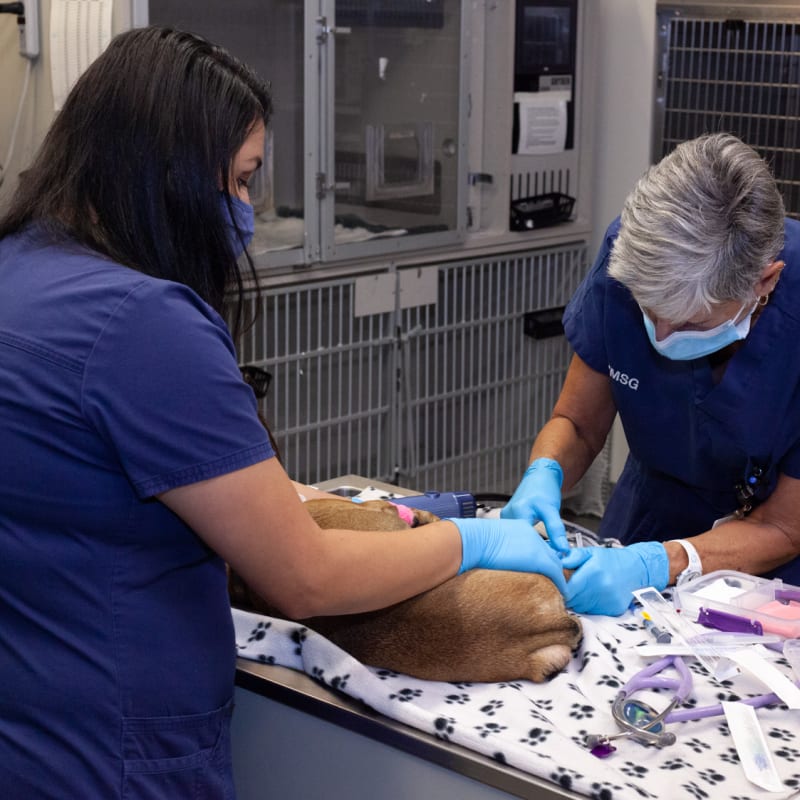Critical Care
Critical Care for Orange County Pets
As part of our critical care services, the team at Veterinary Medical And Surgical Group–OC (VMSG-OC) maintains a critical care unit for pets in need of intensive treatments, therapies, and continuous monitoring until their condition stabilizes.

Critical Veterinary Care
If you find your cherished pet has become injured or ill to an alarming degree, they will require immediate, urgent veterinary attention and lifesaving medical care.
Our critical care team will handle your loved one’s case with the utmost compassion, and do everything in our power to achieve a positive outcome.
Our highly-trained staff provide pets with continuous care and around-the-clock attention. We ensure their condition is improving and aid in their recovery with:
- Constant, intensive monitoring for pets in critical condition
- Electronic monitoring equipment to track your pet's vital signs
- Onsite state-of-the-art diagnostic and treatment tools
Board-Certified Veterinary Critical Care Specialist
A board-certified veterinary critical care specialist has successfully completed comprehensive training in the field of emergency and critical care for pets. During a thorough residency program, the critical care specialist is exposed to a diverse assortment of complex cases.
Common Critical Care Cases
Unfortunately, unexpected illnesses and accidents can happen at any time. At Veterinary Medical And Surgical Group–OC (VMSG-OC), we want you to feel comfortable knowing our experienced team is by your side when these instances do occur.
Any health condition requiring extended and complex treatments, drug therapies, or intensive or continual monitoring will likely warrant critical care. Examples of health issues that may require care in our ICU include:
- Traumas (hit by car, dog fights, burns, etc.)
- Toxicities (rattlesnake bites, poisoning, etc.)
- Not responding well to current treatments or post-anesthesia
- Metabolic disturbances (organ failure, shock, diabetic ketoacidosis, etc.)
- Difficulty breathing (oxygen support for congestive heart failure, airway disease, etc.)
FAQs About Critical Care for Pets
The following are a few common questions our team receives regarding critical care services at our Orange County veterinary hospital.
- Why would my pet need critical care?
Any pet that is seriously ill would benefit from this type of specialist care.
An animal may experience complications from an injury or illness due to physical trauma, poisoning, or complications due to anesthesia or surgical treatment. It is possible for patients with injuries to go into shock or experience organ failure.
Patients in need of frequent blood pressure monitoring, oxygen support, heart monitoring, electrolyte/acid-base blood work monitoring, frequent blood sugar monitoring, intravenous fluids, blood transfusions, etc. are likely to require a specialist.
- What is the difference between veterinary emergency and critical care?
There can be an overlap between critical care and emergency services, as both deal with seriously ill or injured animals. However, there are some important distinctions between these two services.
Veterinary emergency services treat pets that are suffering from acute serious illness or injury requiring intensive and immediate care.
While veterinary critical care services also treat serious injury and illness, these veterinarians do so in cases where animals need complex treatments, intensive or continual monitoring, and crate rest in a medical environment as they recover.
Although patients may be transferred to critical care after receiving emergency services, not all emergencies will require critical care.
Likewise, in circumstances where a pet has undergone major planned surgery, they will need critical care to remain stable, but won't require emergency care.
- What can I expect from the treatment process in intensive care?
Your pet may be transferred from the emergency department, another specialty department at Veterinary Medical And Surgical Group–OC (VMSG-OC), or as a referral from your general practice veterinarian.
When your pet arrives, the specialist will examine your pet and discuss the most likely causes of your pet's issues before creating a diagnostic and intensive care plan. Your pet will be closely monitored throughout their stay to give them the best chance at a full recovery.
The critical care team will communicate extensively with you and the patient’s regular veterinarian to ensure the process is smooth and seamless.
- Can I call the hospital to check up on my pet?
Yes, you absolutely can get in touch with us to check in on your pet's health and status while they are in critical care at our facility.
Rest assured, though, that if there is any problem or change in your pet's condition, we will contact you promptly for information or updates about your companion's health.
- When do your critical care services operate?
Our critical care specialist is available to receive new patients Tuesday through Friday and is supported by the Emergency Department for 7-day-a-week care.
Our Emergency and Critical Care Team work together to provide treatment and attentive monitoring of your companion's health.
- How long will my pet have to remain in critical care?
A critical care unit at a veterinary hospital works somewhat similarly to a human hospital — while we may be able to provide an estimate of your pet's length of stay with us, unforeseen factors can impact the timeline.
We aren't able to predict if and when your pet's condition will change or a complication will occur, but we will communicate with you as much as possible, informing you of any changes in your companion's condition while in our care and what that means for the duration of their stay.
- Will you keep in touch with our primary care veterinarian?
Yes, we will keep your primary care veterinarian updated on your pet's conditions while they are receiving critical care.
We will provide your primary care vet with your pet's medical history and files to ensure your pet receives seamless, integrated care when they return home and are seen by your vet for routine care and checkups.
